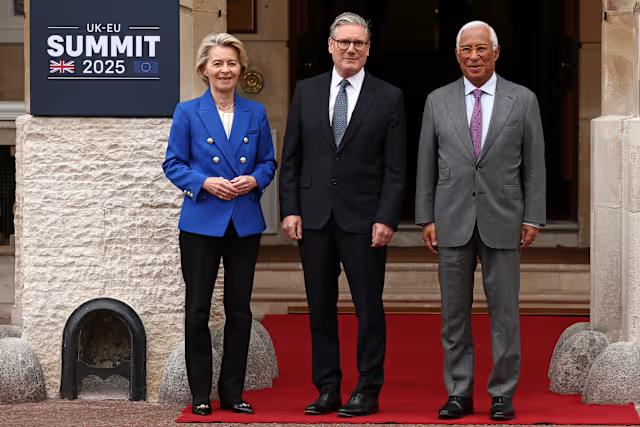LONDON — The United Kingdom and the European Union have reached new agreements on defense cooperation and fishing rights, signaling a major reset in bilateral relations five years after Brexit. The announcements came during a landmark summit in London on Monday, the first formal high-level meeting between both parties since the UK’s departure from the EU in 2020.

Prime Minister Keir Starmer, hosting European Commission President Ursula von der Leyen and other top EU officials, framed the summit as a pivotal moment in mending the UK’s fractured relationship with its largest trading partner. His government has prioritized restoring ties with Brussels since taking office last year, hoping to reverse some of the economic disruptions caused by Brexit.
Ahead of the summit, British media reported that the two sides had concluded a new deal on fishing access, allowing EU vessels to operate in UK waters under a renewed framework. Details were also emerging on a UK-EU defense and security partnership, expected to give London access to an EU defense investment program for the first time since Brexit.
Nick Thomas-Symonds, the UK Cabinet Office minister leading negotiations, hailed the summit as a “historic day,” proclaiming “Britain [is] back on the world stage” in a social media post. However, he withheld specifics on the deals, which are expected to bolster UK-EU military and intelligence cooperation amid growing global security concerns.
Starmer’s administration views these agreements as a foundation for revitalizing the British economy, which has suffered from post-Brexit trade frictions, including red tape, customs delays, and reduced labor mobility. The prime minister believes closer collaboration with the EU could ease these burdens, especially for food exporters and manufacturers grappling with non-tariff barriers.
“This is about making people better off, about making the country more secure, about creating more jobs in the UK,” said Trade Secretary Jonathan Reynolds, speaking to Times Radio. Starmer echoed that sentiment, saying that deeper European ties will complement recent trade deals with India and the United States.
Although tariffs remain off the table under the existing post-Brexit trade agreement, businesses have struggled with border checks and cumbersome paperwork. Professional services and cultural sectors, including finance, legal, and the arts, have also been stymied by new visa requirements and movement restrictions.
Despite the warming relationship, Starmer has remained firm on not rejoining the EU single market or customs union, nor will his government restore the free movement of people between the UK and the EU — a principle viewed by many Brexit supporters as a red line.
Instead, talks have focused on targeted programs, including a youth mobility initiative that would allow young adults in both regions to live and work temporarily in each other’s countries. Similar arrangements already exist between the UK and nations such as Australia and Canada, but discussions with the EU on this front remain politically delicate.
Few issues have been as contentious in UK-EU negotiations as fishing rights. Though economically small, the industry carries symbolic weight, particularly for coastal communities in both Britain and EU countries like France. The new fishing deal announced Monday aims to reduce long-standing tensions over access and quotas that nearly derailed Brexit negotiations in 2020.
The summit also touched on harmonizing standards for agricultural products, with the goal of minimizing costly inspections and certifications for food shipments crossing the English Channel. Thomas-Symonds highlighted the urgent need to reduce bureaucratic hurdles, noting that perishable exports like fresh produce have often spoiled during long customs delays.
“We’ve had lorries waiting for 16 hours, fresh food in the back not able to be exported because it’s going off,” he told the BBC, adding that simplifying certification requirements is a key priority.
The rapprochement has not been universally welcomed. The Reform UK party, buoyed by recent gains in local elections, and the opposition Conservatives have accused Starmer of “betraying Brexit” and capitulating to Brussels. Reform leaders called the agreements a “surrender” before any formal terms were disclosed.
There is also potential friction with President Donald Trump, who has publicly supported Brexit and could influence the UK’s geopolitical strategy should he alter U.S. policy again.
“The reset could still be blown off course by disagreements over how to consolidate existing areas of cooperation like fisheries, or external factors like a negative reaction from Washington,” said Jannike Wachowiak, a research associate at the UK in a Changing Europe think tank.
The summit marks a significant shift in tone from the years of acrimony that followed the 2016 referendum. While the UK remains outside the EU’s core structures, Monday’s agreements reflect a pragmatic new chapter in relations that both sides hope will stabilize trade, strengthen collective security, and restore goodwill.
AP



